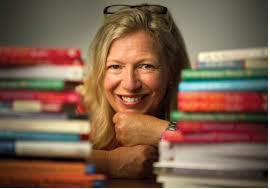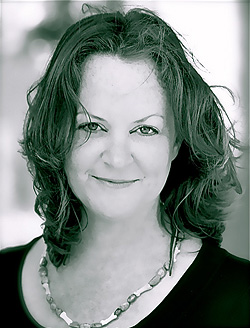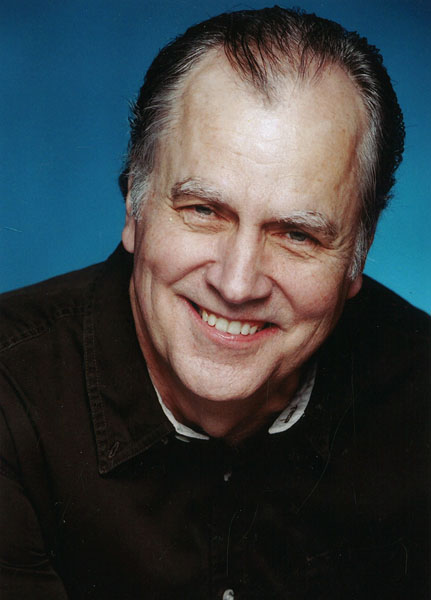Author, acquisitions editor, writing teacher, publishing consultant. Over the years, Jennifer Basye Sander has guided numerous writers from the blank page to the bestseller list. The author of the best-selling “The Complete Idiot’s Guide to Getting Published” and “The Martini Diet,” the outspoken Sander is also the person behind several writing retreats and the upcoming WordWave book festival in South Lake Tahoe. I sat down with her recently to have a frank talk about the state of the book industry.
RE: How many books have you published?
Basye Sander: This sounds like a flip answer but it’s true – I don’t know. I stopped counting. I used to very casually say I’ve written more than 60 books, but that includes five different editions to “A Complete Idiot’s Guide to Getting Published” and six different editions of “The Air Courier’s Handbook” and the couple of times “The Weekend Entrepreneur” has been rewritten under different tiles. So easily 20 of those books are revised editions that have come out over and over again. Also, I write a lot of books with other people. When you look at everything that I’ve written, there are probably only half a dozen books with only my name on them. But I would say combined it probably is more than 60. There were several years when I was doing four and five books a year. I would say it’s certainly been a book a year for the last five years, and there might have been one year were at least two books came out. 
RE: It seems like you cover a very broad breadth of topics.
Basye Sander: They run the gamut. When it comes to book sales certainly the big drivers have been the “Complete Idiots Guide to Getting Published” and then the “Miracle” series that I did for Harper Collins back in the late 90s and early 2000s. Combined those books are probably half a million copies. The “Miracle” books and then about 150,000 for the “Idiots Guide to Getting Published.” So that establishes the range – either I’m writing about writing or I’m writing about miracles. Everything else just kind of falls in between. But it’s all nonfiction. I’ve written a number of small business books, personal finance books, inspirational books, health books. I did an anthology with Bernie Siegel who is the doctor who did “Love, Medicine and Miracles.”
RE: You were also an acquisitions editor for a long time. There are so many mistakes that writers can make. What is the most common one you see?
Basye Sander: The most common one is not taking into account the needs of the reader. We’re all welcome to write whatever we want to, but to the extent we want other people to read our material we need to think about the person on the other side of the page. So many people, particularly with self-published books, are just not taking into account why somebody would pick up a particular book on a particular topic. Generally because they have a problem that they either want addressed or want help with. A quick example – years ago I met with somebody who wanted to hire me to help him with his book. As he described it to me, it was a book that would help men who were trying to support their partner going through cancer or other dramatic health crisis. Sadly, there’s a big audience for that so it seemed like a good idea and he seemed entirely focused on what he wanted to do, which was to help other guys. But the first two chapters of his manuscript were literally a date and time recounting of every single appointment that he’d gone to with his wife and her specific cancer diagnosis and her specific treatments. I told him the audience for your book is men in pain. They’re worried and frightened. Why would they want to spend all this time going through all this material? It sounds harsh but the truth is they don’t want to read about you. You need to get right to helping them. I understand, we all want to tell our stories, and we are totally entitled to it, but if we want other people to read what we have written, we need to think about why somebody is picking up this book at this particular time.
RE: Which is a big challenge if you’re self-publishing.
Basye Sander: Exactly. We’re all too self-involved, and I include myself in this. But the other big mistake, frankly, is that we all assume somebody is interested in what we have to write. Because people aren’t. Particularly with self-published works. Everybody thinks, ‘oh it’s so easy now to get your work in print and sell it,’ and so forth. Well, you know, it’s never been that hard to publish. It’s just a question of writing a check to the printer. What’s hard is to get somebody to buy your material. If it was so easy to sell books, every Random House book would be a best seller. But it’s not easy to sell books. So, yes, methods of publishing have changed. What has not changed is people’s fundamental interest in buying a book, regardless of how it’s delivered or what it’s about.
RE: You mentioned how many books you’ve done when working with a partner. That can be gratifying and it can be maddening. You’ve done quite a bit of it successfully. What has been the secret for you to have good working relationships with fellow writers?
Basye Sander: This is a terrible thing to admit but what works best is when it’s my idea and I’ve got the deal. So I’m literally in charge. I’m still in the driver’s seat. The worst experience was somebody who was initially my client. To be blunt, I didn’t think her original idea was really that good. I asked her to refocus it. She did, which made me want to be involved with this project too. But ultimately we were not a good fit. It’s a mortifying book and it was a horrible experience going out on the road to promote it with her. Really horrible.
RE: Tell me more about Tahoe WordWave, your upcoming conference in Lake Tahoe. As busy as you are, what drives you to put on an event like this?
Basye Sander: To be blunt, with Word Wave there two things driving me. One is just that I think Tahoe is so great and I would love to see more literary stuff going on up there. But I also I need to keep my credentials fresh. I no longer teach for the UC Davis Extension because the writing portion of the program got closed down. That was always a nice way to market myself. It’s been more than a dozen years now since I worked for Random House, so all that “former senior editor at Random House” in my title is getting kind of old and tiresome. It’s true I spent 20 years as an acquisitions editor, but what have I done lately? So how do I continue to go out in the world and present myself as a publishing profession, a book professional? Being the founder of a cool book festival like WordWave is one way, and a nice little feather in my cap. And then the Hemingway lecture that I created, which will be a big topic for academic circles.
RE: And you present that at the conference?
Basye Sander: I will be the closer at the WordWave. It’s called, “Would Hemingway Get a Book Deal in Our Time: A look at the Publishing Past to Understand the Publishing Future.”
RE: Tell me about the Hemingway lecture.
Basye Sander: I have been hearing writers say forever, ‘oh it’s so tough to get published nowadays even Hemingway couldn’t get published nowadays.’ So I went back and re-read a lot of Hemingway’s stuff. I talked to a couple of Hemingway experts and spent time with his daughter in law, people who actually knew him and his habits and his style. And to me, there is no doubt that Hemingway could get a book deal in our time because not only was he a great writer and put in the time and effort and work to become an even better writer, but he was a hell of a networker. He got out there and made sure that he befriended all of the older, better published people and those were the ones who promoted him. And yes, does the method still work today? Yes it does. And that’s why people should go to writer’s conference and book festivals, take courses, sign up for seminars, anything they can do to get out of themselves. We all just want to sit by ourselves in a café writing in a notepad. Well, that’s great but if you really want to get published, now is a wonderful time with all this stuff happening to get out and meet people who are in that world already and ask for their help. If you have some talent and are dedicated and they sense that you’re serious, chances are they will help you. So that to me is the exciting thing, is that there is more opportunity than ever before. Even though people think it’s so limited, there’s all this great energy around it and I think it can only get better.
RE: Where will the festival be held at in Tahoe?
Basye Sander: Valhalla, next to Camp Richardson. We have of course negotiated good prices. Anyone who wants to drive up and stay at Camp Richardson gets a good deal.
RE: Are you hoping to keep this small?
Basye Sander: Actually we want it to be huge. Nevada has Burning Man; Tahoe’s going to have Reading Man! Something much hipper and more interesting than your flat, basic come and meet an author book festival. We originally wanted to have poets on paddleboards, swim races, all kinds of stuff. Sort of a summer camp with all your famous writers. As it is, it’s happening in October rather than the summer, so I don’t think I can get the poets out on paddleboards. But that Friday there will be classes and then a Friday night steampunk dance party called the Tall Timber Ball. Then Saturday is the free book festival with all kinds of stuff going on. And that Sunday once again there will be classes. Rather than sit in a class room, in some of them you will go on a short hike with Pamela Houston or the poet Camille Dungy. You go someplace with people and sit outside and write, so it’s a different atmosphere than an academic thing on campus.
RE: What’s the most positive thing right now about the writing industry?
Basye Sander: In the first place, there’s a lot of energy and excitement around it, which isn’t always true of the publishing business. It’s kind of a dull, antiquated business. So the idea that even fights between Amazon and the publishers over discounts and distribution are front page news is incredible. It’s a business fight, but all of the sudden there it is on the front page of the New York Times, which is wonderful. Those kinds of things have always gone on, but the very idea that people now view the book as this embattled, in-peril thing and that bookstores need to be saved and let’s do a Go Fund Me or Kick Starter campaign is great.
RE: Presuming somebody understands that this is a business and the need to write things people want to read, what other key advice would you give to somebody who’s thinking about doing this? They have a good story but maybe don’t know where to start. What would you tell them?
Basye Sander: If they have the time and energy and if they can afford it, get a job in a bookstore. It’s fascinating to work in a bookstore, even for a short time, and see how people interact with books. What they ask for, what they look for, what there’s too many of, what there aren’t any of. Its s great background that would help somebody have a better understanding of who publishes what and what the formats are. There are formulas. People don’t understand. You want to write romance? It’s this many pages and this many characters and the action builds this way. Same thing with fantasy or science fiction. Let’s say I’m with Tor Publishing, which is science fiction and fantasy. Tor probably doesn’t publish hardcover books that are 1,200 pages in length. So why would you write that and then get pissed off that they’re not interested? I just need to know, whatever field it is they want to write in what the standard practices are. I’m not saying things always have to be formulaic, but again why write a six volume series and then be annoyed when somebody says, sorry, we’re only interested in one-offs. Writers don’t understand, and I get this, none of us want to be categorized. ‘No, no, I write sort of a science fiction health advisory kind of a thing.’ No! Books need to fit into categories. You have to do your homework. Otherwise you set yourself up for disappointment and hurt feelings.
RE: For self-publishers, how important is the cover art?
Basye Sander: Again, we’re all welcome to self-publish as much as we want, but we are in competition with Random House and the covers of Random House and the sales force and marketing arm of Random House. So if you have written a fantasy novel or historical romance and you think the world is going to love this story, understand that your work is going to be compared to all of these things that are professionally packaged. Invest in a professional cover from a book designer and not your next door neighbor’s kid. It’s just mortifying some of the covers that are out there. And before you send anything to a printer investigate what you want your distribution to be. I used to teach a course called “Thinking of Self-Publishing? Let’s Run the Numbers” where I would hand people a worksheet, the same kind of thing you would do in P&L inside of a publishing house. How much do you think it’ll cost to pay for the cover, to edit, to print it? What’s your distribution plan? What’s your publicity plan? Most people would say, ‘well, you know, I thought it would be $100 to my sister in law to have her copy edit and I thought it would be free for the cover because my son is going to do it. And then the local bookstore will carry it.’ Oh really? Well have you gone and asked them? Because I have and they won’t.
RE: Why is that?
Basye Sander: Because they’re so flooded. If they like it, a local seller like Avid Reader (a multi-outlet store in the Sacramento area) will let you have a launch party. But that is one night and then they never want to see you or your book again. And people are stunned and angry by that. Writers get angry about that, book stores know that local books often just don’t sell. They know it’s the loneliest, saddest part of the bookstore. Nobody goes there, nobody buys them. It’s pathetic. It’s heartbreaking, and people take it so personally, but why should you? Every single sale needs to be created by you. People don’t get it. They think, my book is going to be in a bookstore, it’s going to be on Amazon. Well, so what? Why would somebody find it? You have to steer them there. It’s very, very hard to sell a book.
RE: Any final thoughts?
Basye Sander: Keep writing and come to WordWave!


